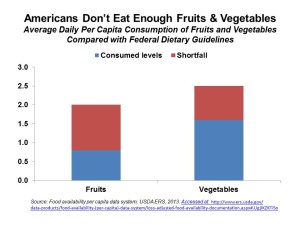 More than 127,000 people die every year in America from cardiovascular disease, accruing $17 billion in medical spending. Heart disease is a “costly killer,” according to the Union of Concerned Scientists, who has calculated The $11 trillion reward: how simple dietary changes can save lives and money, and how we get there, published in August 2013.
More than 127,000 people die every year in America from cardiovascular disease, accruing $17 billion in medical spending. Heart disease is a “costly killer,” according to the Union of Concerned Scientists, who has calculated The $11 trillion reward: how simple dietary changes can save lives and money, and how we get there, published in August 2013.
That $11 trillion opportunity is equal to the present value of lives saved.
The solution to bolstering heart (and overall health) and saving money (medical spending and personal productivity) is in food. We’re not talking about genetically engineering anything special or out-of-the-ordinary. We are talking about making healthy food more accessible to every one.
Simply put, the UCS say, Americans aren’t eating enough fruits and vegetables. This may sound simple, but behind the phenomenon is a U.S. food system that’s built on subsidies – that is tax breaks and financial programs – that encourage the growth and distribution of less-than-healthful foodstuffs. Reforms such as encouraging farmers to increase their yield of fresh produce; subsidizing loans for market infrastructure of grocery stores, farmers markets, and food hubs for distribution; and, lowering barriers for people trying to redeem food stamps at local markets, together would improve peoples’ access to healthy food that lowers risks of heart disease: the #1 killer of Americans.
There is a large evidence base that proves expanding fruit and vegetable consumption lowers all kinds of chronic disease, and especially cardiovascular disease: high blood pressure (hypertension), coronary heart disease, and stroke. Other lifestyle choices, like smoking and sedentary behavior (The Sitting Disease), and the natural aging process also contribute to heart disease.
Health Populi’s Hot Points: For those of us who can reallocate our grocery dollars to the produce area of the store: do so. Spend dollars and cents on the foods that make heart-healthy sense: fruits, vegetables, lean proteins (chicken, fish, lean pork, and lean beef if you are a ‘carnivore’), Greek yogurt, and the Mediterranean-style diet that includes healthy fats like olive oil.
In addition to spending more on produce on the outside aisles of the grocery store, and less in the interior, do read labels of cans and packages on items you’re shopping for in the middle of the store. Try to avoid corn syrup, unhealthy oils, and ingredients your grandmother didn’t know or couldn’t pronounce (as Michael Pollan professes). Your heart and gut will thank you.
Changing what you eat can often help you get off of prescription drugs for heart disease and diabetes if you stick to your behavior change, the Mayo Clinic and other experts have shown.
In addition to eating more fruits and vegetables, JustStand.org also encourages us to avoid The Sitting Disease, that inertia that keeps us on our bums and not moving around. That’s easy to do and it costs no money — but doing so could certainly help you save money and life-years, too.
Finally, ask your Congressfolk about their take on food and health. It’s your health and money that’s at stake.




 I'm in amazing company here with other #digitalhealth innovators, thinkers and doers. Thank you to Cristian Cortez Fernandez and Zallud for this recognition; I'm grateful.
I'm in amazing company here with other #digitalhealth innovators, thinkers and doers. Thank you to Cristian Cortez Fernandez and Zallud for this recognition; I'm grateful. Jane was named as a member of the AHIP 2024 Advisory Board, joining some valued colleagues to prepare for the challenges and opportunities facing health plans, systems, and other industry stakeholders.
Jane was named as a member of the AHIP 2024 Advisory Board, joining some valued colleagues to prepare for the challenges and opportunities facing health plans, systems, and other industry stakeholders.  Join Jane at AHIP's annual meeting in Las Vegas: I'll be speaking, moderating a panel, and providing thought leadership on health consumers and bolstering equity, empowerment, and self-care.
Join Jane at AHIP's annual meeting in Las Vegas: I'll be speaking, moderating a panel, and providing thought leadership on health consumers and bolstering equity, empowerment, and self-care.